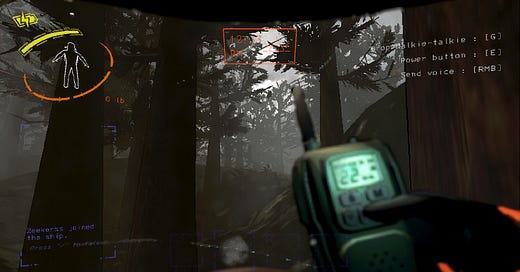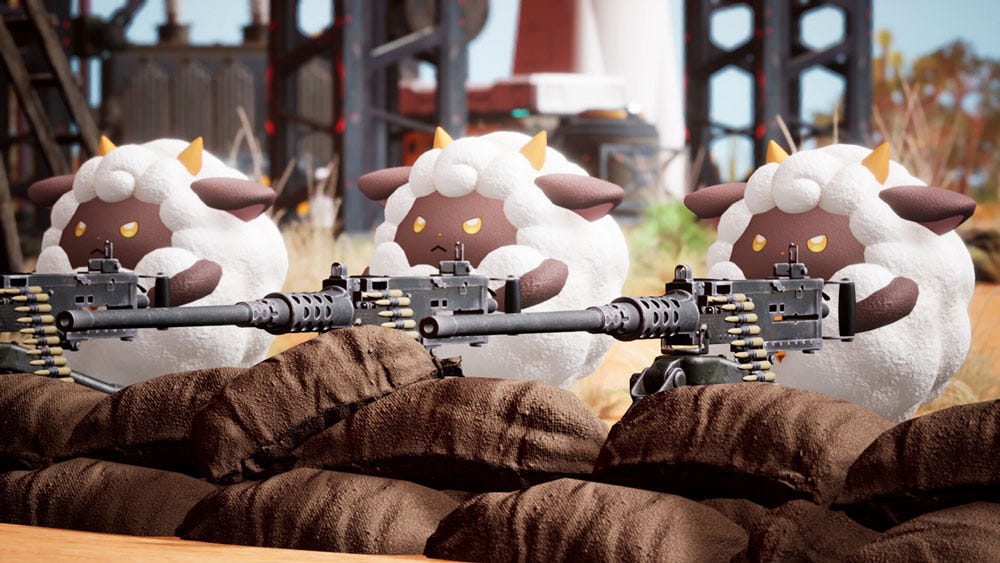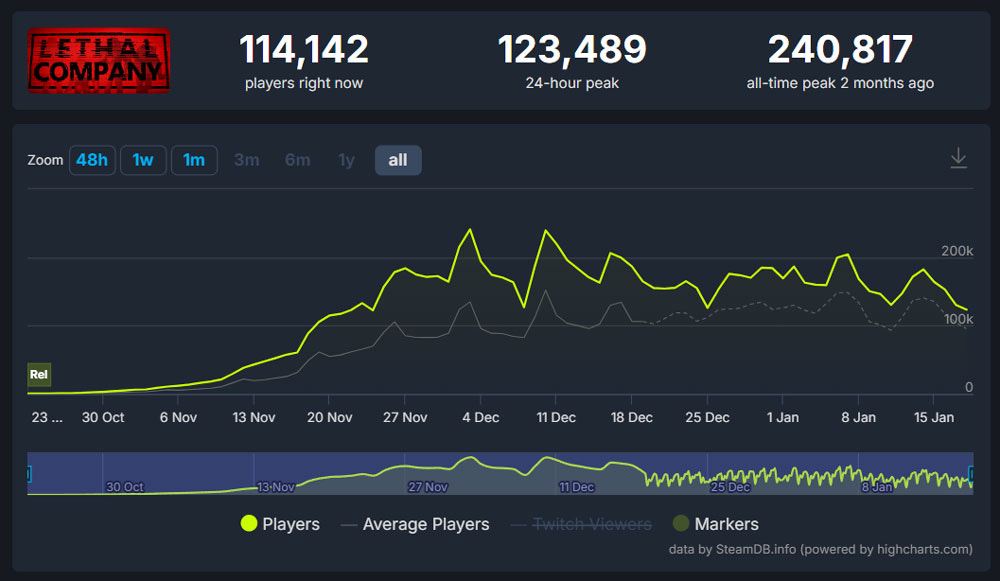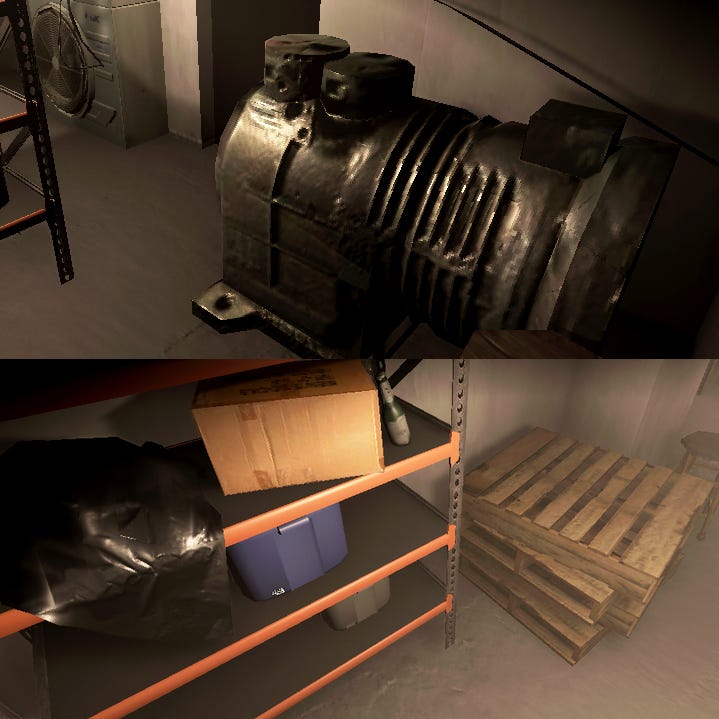The 10-Year Journey Behind Lethal Company’s Success
push to talk #3 // feat. an interview with the 21-year-old behind one of the best-selling solo-dev games ever
Today’s (very long) edition of Push to Talk shares the history of the breakout hit game Lethal Company and the evolution of its young creator, Zeekerss. Forget what you’ve heard: this is not a story about a kid getting a lucky break. It’s a story about obsession—a brilliant 10-year-old Roblox player who discovered an artistic niche and pursued it with unmatched passion and intensity.
Find that story below. But first check out this week’s most-shared news links.
Scuttlebutt and Slackery
The week’s most-shared, oft-Slacked, and spiciest games industry news links.
The “Pokémon With Guns” Game Seems… Kinda Good? - For the last few years, Japanese developer Pocket Pair has been astonishing and provoking us with trailers for Palworld, a game that appears to be a 3D open-world Pokémon knockoff where the pocket monsters have guns… and are also… victims of an oppressive system that forces them to manufacture assault rifles? Seriously, watch one of the trailers. The game went into Early Access this week and early impressions are surprisingly strong. (IGN)
Blizzard Teams With… NetEase? Again? - This is one of those stories that you have to read almost entirely between-the-lines, and those lines are hilarious. After the Bobby Kotick-led ATVI broke off its relationship with Netease in 2022, new ATVI owners Microsoft have apparently smoothed things over only one month after Big Bobby K’s exit from the company. I hope we get the uncensored version of this story someday. (PocketGamer)
MSI Reveals a Monitor That Lets You Cheat at League - This new MSI monitor comes with enemy-detection software that scrapes minimap data to highlight opponents in League of Legends that you might not have seen otherwise. The cheats are apparently undetectable by game clients since they run off a chip built into the monitor itself. I have to imagine this isn’t going over well with the Riot Games gang. (Tom’s Hardware)
An Out-of-Context Ubisoft Exec Quote Goes Viral - Here’s what happened: Ubisoft executive Philippe Tremblay did an interesting interview with GamesIndustry.biz where he talked about the successes and challenges Ubisoft has faced running their subscription-based service. Insider Gaming took Tremblay’s words out of context and implied that he wants to force gamers to give up owning games. The IG post blew up on Reddit. Then it blew up on Twitter. Everyone got mad at Ubisoft. Myself and others jumped in on Reddit to point out that IG’s framing was wack, to little avail. What’s there to learn from all this? Probably nothing, but it was a fun ride.
How Lethal Company Sold 10 Million Copies
By now, you might have heard of Lethal Company.
Since its release just a few months ago, pundits and analysts have marveled that the scrap-collecting multiplayer adventure—which was made by a single 21-year-old developer who cut his teeth making Roblox games—appears to be consistently outselling franchises like Call of Duty on Steam.
The media focus on sales makes sense, as the numbers are genuinely astonishing. According to tools that utilize the Boxleiter method of calculating sales based on the number of reviews, we can estimate with some certainty that Lethal Company has likely sold more than 10 million copies and generated more than $100 million in revenue. It is by any measure a generational breakout hit.
Given the facts—the tender age of the dev and the size of the success—you might be tempted to dismiss Lethal Company’s success as a fluke, a lucky break.
Today, I want to make the case to you that this view is mistaken. Lethal Company is not a fluke. It’s the product of a truly brilliant approach to social system design in games and a decade-long journey that saw its creator, known online as Zeekerss, release 19 games prior to Lethal Company.
“[Lethal Company] is actually a game about laughing at death.” – Zeekerss
The Zeekerss Roblox Training Arc
Although Zeekerss rarely does interviews, it’s not hard to track his evolution as a game developer and an artist. Zeekerss has publicly logged his entire journey on a YouTube channel that he started on May 29, 2012.
At the time, he was 10 years old.
The early content on the channel is mostly made up of skits and montage music videos created with friends inside Roblox. One early example is a three-minute scenario where a character representing Zeekerss tells his dad “im leaving roblox.. forever,” before wandering slowly off into the sunset while an instrumental piece by Cowboy Bebop composer Yoko Kanno plays.
Zeekerss didn’t actually leave Roblox then. Instead, he began dabbling with the platform’s game creation tools and releasing his own small, experimental games. The first, Dark Mansion, released in July of 2012, with a sequel appearing a little over a month later. These games are almost all delisted or broken within Roblox now, but we can still get brief glimpses of them thanks to Zeekerss’s YouTube channel .
Over the course of the next four years, Zeekerss released 12 games in total on Roblox, each increasing in complexity and ambition. A trippy side-scrolling adventure called A Lucid Dream was released in 2014, and was nominated for "Best Single Player Game" in the 2014 Bloxy Awards. More sidescrollers followed, and the following year Zeekerss seems to have found his niche with 3D horror games, including They Breathe (2015), Light Bulb (2015), and Silent Dark (2016), this last title becoming the most popular game Zeekerss released on Roblox with over 5.4 million “visits,” to use the platform’s parlance.
Silent Dark was also the final game Zeekerss developed on Roblox. In a November 2016 tweet, he said that “one of the main things keeping me from wanting to make more games in Roblox is that they'll eventually all break because of updates. Silent Dark has broken like 5 times all because of updates and I keep having to fix it. I think A Lucid Dream's ending is broken too, ugh.”
The Pivot to Itch.io and the First “Mature” Zeekerss Games
Zeekerss’s move away from Roblox development was also a chance to start experimenting with more complex tools. On his YouTube channel he posted a series of teasers for a (still-unreleased) text adventure initially called A Dark Place To Hide, developed using Unity.
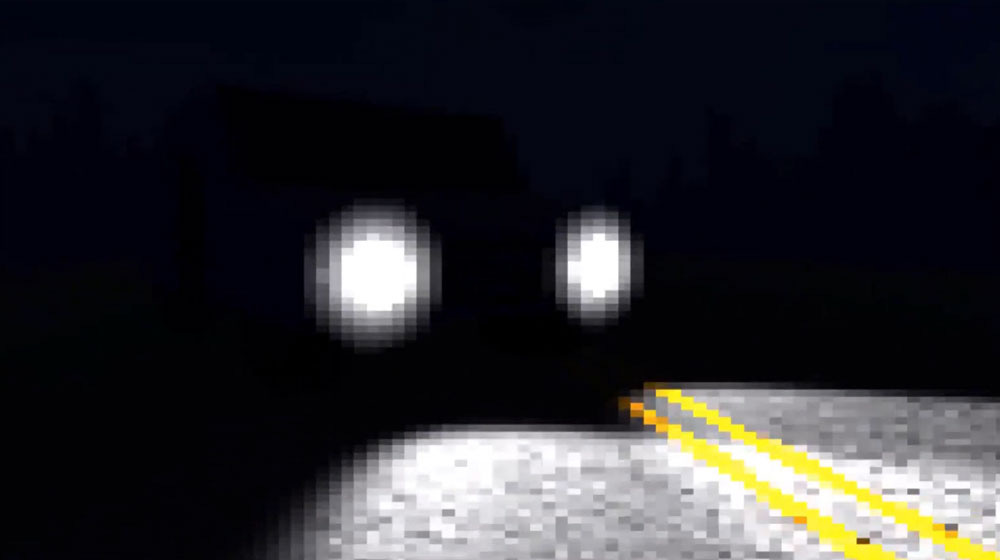
At the same time, Zeekerss was posting smaller experiments on his itch.io page, including Too Many Asteroids, Drive Home, and Take Your Wish. Although these titles might be more accurately called “demos” than games, they were vital stepping stones that unlocked an evolutionary leap in Zeekerss’s approach to game design.
By August 6, 2019, Zeekerss had officially opened up a Steam page for his text adventure, now retitled Welcome to the Dark Place. Zeekerss would continue to release his next three games—It Steals (2020), Dead Seater (2021), and The Upturned (2022)—on both itch.io and Steam.
It’s in this phase, starting with “arcade horror” title It Steals, that Zeekerss entered what we might call his “mature” period, such as it is. His art style was coming into focus (an ironic choice of words, perhaps, given its intentionally lo-fi feel). Content creators and streamers began taking notice of his work, and the level of attention on his games—while not yet at the level of his biggest Roblox hits—began growing rapidly.

In some ways, building for streamers was a calculated choice by Zeekerss. The very first teaser for It Steals features what seems to be real audio reactions of players navigating the game’s spooky mazes and traps. The players can be heard nervously chuckling, screaming, and ultimately laughing at themselves when they inevitably fall prey to the game’s murderous monsters. Zeekerss was paying close attention to how players might react emotionally to his game’s mechanics.
After the game’s July 2020 release, Zeekerss posted the following compliation of streamer reactions to It Steals:
Fear is a powerful emotion, and Zeekerss was getting better all the time at evoking fear with his games. His next title, Dead Seater, took the scares to yet another level. Another fun reaction comp can be found here.
But it was here, after the release of Dead Seater, that Zeekerss had a revelation. As he tells it, he realized that he was no longer happy simply making games that were scary. He wanted to push further and combine the scares with more surprising emotions.
It was time to get scary-funny.
The Evolution of Fear
“After making Dead Seater,” Zeekerss says, “I realized I was intentionally holding back a lot of my identity from my games, since I was so focused on making something scary. When I stopped confining myself to that one goal, my next game, The Upturned, suddenly became funny—in fact, my games had always been funny accidentally. But now, they could be funny and scary at the same time.”
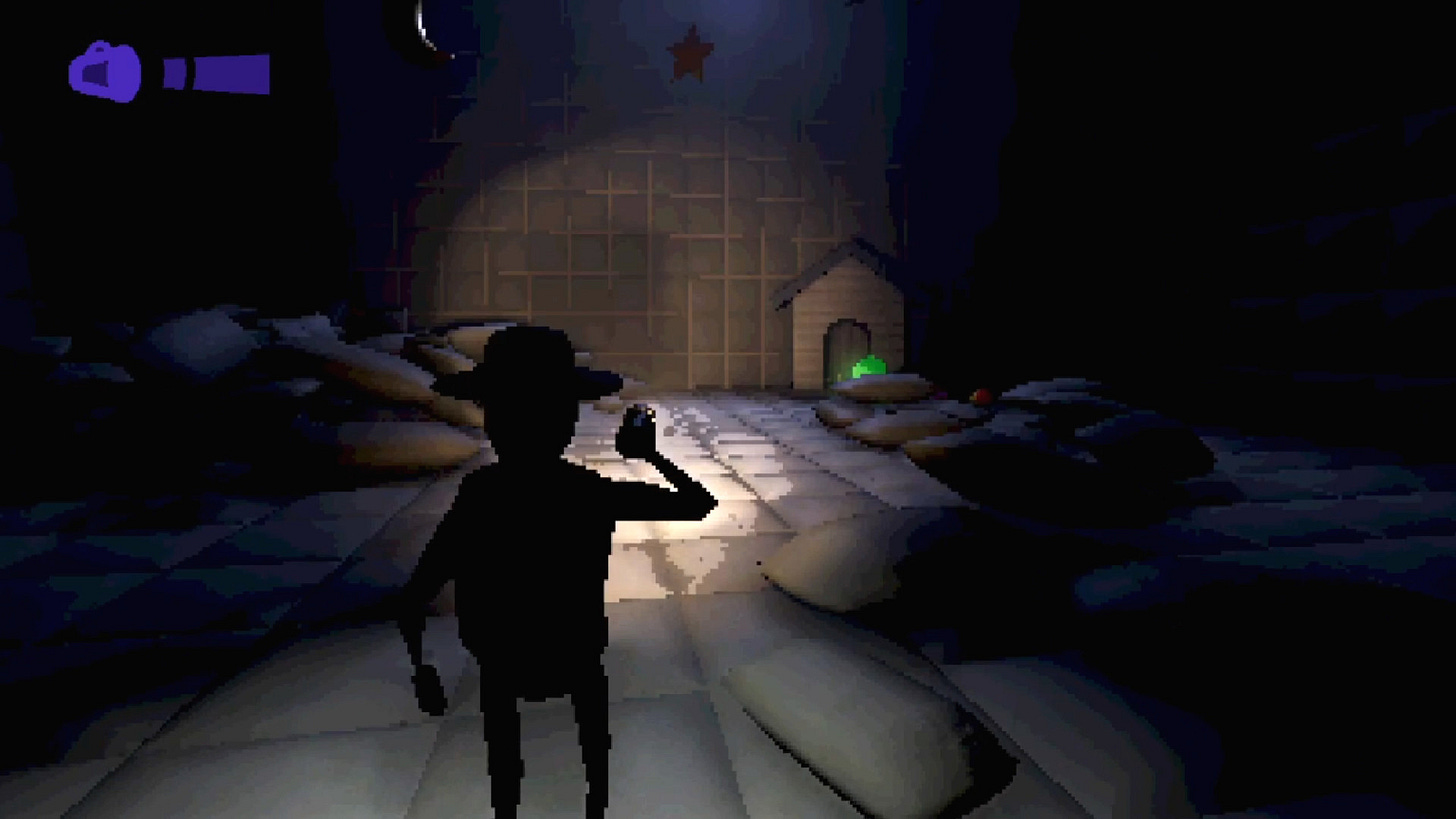
The Upturned, Zeekerss explains, is indeed a horror game, “but it's also a friendly game that actually wants you to be happy. It's completely disinterested in being a horror game on the surface level, but it's still able to use all the elements of horror just to have fun with you. In the end it wants to delight you instead of traumatize you.”
If you watch trailers for The Upturned, the new combination of humor and horror is almost immediately obvious in the character design, animations, and even the music. But beyond the stylistic changes, there’s also a pretty clear step forward in overall visual fidelity—for lack of a better way to put it, this looks like a legit indie game.
The game sold well, and earned more attention than any of Zeekerss’s previous post-Roblox titles. But his next project, his 20th game overall, would be even bigger, and it would apply everything he’d learned up until this point.
On May 11, 2022, Zeekerss posted a video inviting his growing community to follow the development of his next game on his Patreon page.
Pitched as “a way to support me making indie games long in the future,” Zeekerss corralled a small circle of dedicated fans into his Patreon page, where—true to his word—he logged the development of Lethal Company with weekly journal entries offering extremely detailed insight into the game’s creative process.
“Running a Patreon was the perfect excuse to keep a journal on my thoughts as my game development went on,” Zeekerss says. “The Patreon development logs even captured a crisis back in late 2022, when I had to rediscover what the game was going to be and scrapped major amounts of content. I'm really proud of that being recorded.”
Having read all of these Patreon entries, I have to admit it really is an extraordinary document.
Lethal Company is a game we’ll be talking about for years, and having a resource like this showing the twists and turns of its development is a blessing for game historians and anyone who wants to understand game development more deeply. It reminds me of the game dev journal that Jordan Mechner kept while creating the original Prince of Persia.
Although Zeekerss made drastic changes to the game’s structure over the course of development, it’s striking—from my outsider’s perspective—how consistent so many elements of Lethal Company were apparent even from the beginning.
One of the most interesting early posts captured Zeekerss’s thoughts on the evolution of the game’s textures.
“One notable thing that happened in the last couple weeks is that I learned a more advanced method of texturing objects, so stuff can look like this while having much less polygons,” he writes, before sharing the image below:
“I am mostly happy about this,” he wrote on Patreon. “Only slightly scared by the fact that it will probably result in a drastic change to the look of my games moving forward.”
Week by week, Zeekerss updated his small community on his progress. By August 4, 2023 he’d felt confident enough to start small-size playtests the game—and even announced an imminent release date: Monday October 23, 2023.
True to his word, the game released on schedule.
It peaked at ~611 concurrent players on that first Monday, growing steadily every day thereafter.
By the following Monday (Oct 30th), it was up to ~3,200 peak CCU.
The Monday after that: 12,220 peak.
The Monday after that? 43,268.
The growth accelerated. By late November, Lethal Company was one of the most popular PC games in the world.
This was textbook hockey stick growth. Pure word of mouth—yes, fueled in part by influencers, but clearly not dependent on any singular “takeoff” event.

A Monster Hit is Born
So, why did Lethal Company blow up like it did? We now know that it was not some lucky strike by a greenhorn dev—this game is the culmination of a decade of focused work by an artist honing his craft. But, admittedly, success of this scale had never come for him before. So what’s different about Lethal Company?
If you’re looking for some easy takeaway to apply to your own game, I’ll tell you right now that I don’t think there is one. There’s only one Zeekerss, and you can’t just do what he did and expect the same results.
But there are a couple of very interesting lessons here.
One is inherent to the story we’ve just told: obsessive pursuit of a craft, combined with an incredibly high number of “at-bats” (20 game releases) drastically increases the odds you’ll see outsized success eventually.
This takeaway may feel obvious, but given the number of people who give up on game development after only one or two attempts, we must conclude that it isn’t. This point was driven home by Zeekerss himself in a throwaway Discord post that blew up on Twitter / X:
The second lesson, and the one that I think should get more game developers talking, can be found by examining the social systems that Zeekerss built into Lethal Company, particularly the way voice chat works.
In short, voice chat is built directly into the game, and is proximity-limited by default: you can only talk to others in your lobby when they’re near you. This can be modified if you find walkie-talkies, but generally you need to stay close to other players if you want to keep comms open.
There are also very scary monsters and traps in the game—they’re weird and frightening enough that you’ll sometimes find your group of friends scattering in all directions to get away from a threat. That’s when things get really interesting.
The clip below is a perfect example:
Moments like this are so emotionally charged and hilarious—your friend has been possessed by a demonic mask and his body has been replaced by a murderous automaton controlled by the in-game AI.
No medium other than games could produce a situation like this, and it’s the perfect example of what Zeekerss considers his breakthrough realization after his release of Dead Seater: it’s one thing to make a game scary, but to really take it to the next level, what if you made the game funny and scary at the same time?
“Because the creatures and hazards are so ridiculous, moments of actual fear and isolation in Lethal Company are usually followed right up with laughter from your friends in the afterlife,” Zeekerss tells me. “Gameplay-wise, it's actually a game about laughing at death.”
Watch VODs and livestreams of Lethal Company and you’ll see people laughing at death nonstop. Something about the game invites it—and not only that, but invites real play, as in pretend play.
“When my friend dies from a lightning strike and I can't talk to him anymore, I pretend to cry out and say, ‘Noooo!’ as if he won't just be resurrected in five minutes,” Zeekerss says. “And I know everyone else does the same thing, because it's funny to see the stupid guys in cartoon space suits experiencing actual tragedy.”
Lethal Company isn’t just a scary game, or a funny game. It’s an interactive system that generates stories—some scary, some funny, mostly both. And when you get a great story out of a game like this, you have to tell others about it. That, in my view, is a big part of the game’s word-of-mouth success.

Forest Willard, the lead programmer on Among Us and a co-founder of Innersloth, says that he sees in Lethal Company a sort of kindred spirit to his own team’s hit game. “It's kind of a personal bias, but I feel like social/multiplayer indie games are underserved,” Willard says. “There's something special about indie jank. Stuff that works just enough that the flaws become comedic.”
In Willard’s view, Lethal Company is tapping into a rare audience with a gameplay style he calls “f— around and find out” which streamers and their audiences love.
Sidebar: A Lethal Company Testimonial
My friend Lester Chen related the following Lethal Company story to me, which I think beautifully captures the hilarious magic of the game:
on christmas day i bought my brother a steam deck and we hopped on lethal company
blackout drunk guy joins our lobby and proceeds to perfectly explain the game to us while also burping and telling us how drunk he was and taking shotsthen for long periods of times i think we heard him snoring
but then he would wake up, run into the building and come out with all this loot. not saying a wordstarted calling my brother Dumb and me Dumber
and pointing at us and telling us to line up and stay close to him
but then he would pass out mid game and we'd all of a sudden be left alone without a guide
but every time we thought he was just going to log off, he would reanimate, we'd hear a beer crack, and he would just clean house and extract
truly one of the most surreal gaming moments i've had and my brother (40), who i don't get to play videogames with that much, said it was the hardest he has ever laughed in a videogame
A Look Toward the Future
Lethal Company has already made—at least—tens of millions of dollars in its first few months. But you wouldn’t know it by talking to Zeekerss, who seems to be keeping his head on straight: To have an active community gathered around a game you’ve made, he acknowledges, “is a rare and lucky experience.”
“I think you should always be a little suspicious when getting any huge amount of success and attention all of the sudden,” he tells me. “So my family has been cautious, and it has changed my life's future into a different kind of uncertainty than it was before. Money is powerful but also imaginary and untrustworthy. We're all excited about it though!”
So what’s next for the 21-year-old indie game dev?
It probably won’t surprise you to learn that the answer is more games.
“I have several ideas for entirely new games,” Zeekerss says, “one being multiplayer, but I want to keep them secret. I also want to finish my unreleased text adventure, Welcome To The Dark Place.”
Zeekerss also says he intends to keep going with his Patreon, which he says gives him extra motivation to keep up the pace of his work. But first, Zeekerss says, he’s going to have fun releasing updates for Lethal Company. Version 50 of Lethal Company, he promises, will be “packed full of stuff.”
In the meantime, I’ll be staying glued to Zeekerss YouTube channel, where he is alternatively uploading trailers for his new games and random gameplay from Splatoon 3.


